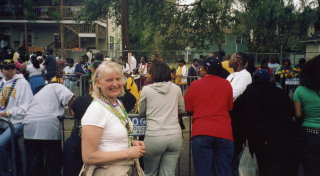
Darlene Bigus-Doheny, Zulu parade, 2005.
Everywhere else, the period after christmas and new years is down time, the time where you get back to work and start thinking about dieting and excersize techiques to lose that 'holiday five' you've put on. Here, it's the start of Carnival Season.
"Mardi Gras" is not just a one day thing. It's a series of parties, balls, parades and other events that starts (fairly quietly) at '12th night," twelve days after Christmas. This past Saturday, two parades rolled over in the suburbs on the West Bank (the Krewe of Allah, and another one I can't remember the name of) and the Phunny Phorty Phellows, an alliance of local business and chamber of commerce types, staged their event, which consists of renting a streetcar and running it up and down the Saint Charles Avenue line and throwing beads at people and sloshing beer out the windows. This year, because the St. Charles line is still out of service, they ran their car on the Canal line, which terminates near my house. So I got a really, really early preview of the coming parade-related traffic tie-ups to come, on my way home from a rehearsal.
Last year, for obvious reasons, there was some national debate over whether Mardi Gras would happen at all. There was even some rather mean-spirited discourse about the desirability of 'wasting tax dollars' on such 'frivolous' events, or of running parades along routes where 'people had drowned not months before." This sort of talk showed a stunning unfamiliarity with local geography in the latter case (most parade routes were along St. Charles Avenue, which didn't flood) and complete misunderstanding of local culture and tradition.
First of all, contrary to what you may have seen on "Girls Gone Wild" videos, a large part of Mardi Gras (or "Carnival" as it's known by many locals) is an event staged for the benefit of children. Really. In the weeks before Fat Tuesday, local hardware stores do a land-office business in 'Mardi Gras Ladders,' step-ladders with a box attached to the top, in which people place their toddlers in order to bring them up to the level of float-riders and give them a sporting chance at catching some 'throws'(beads, but also toys, stuffed animals, tiny frisbees, rubber spears, and aluminum coins or 'doubloons' emblazoned with the Krewe's emblem). There's a joke among native New Orleanians that the first words they learned how to say were "throw me sumpin, mistah!"
Second, Mardi Gras does not involve any 'tax dollars,' at least beyond the extra fire and police protection supplied by the city. There is also no corporate sponsorship. The entire event is paid for by the members of the carnival organizations, or Krewe's, who stage the various parades. Some of these Krewe's, like Rex, consist of the business and social elite of the city and trace their origins back a century of more. Othere's like Zulu, have their origins among working class folks, in Zulu's case, primarily African-American.
Zulu was, in fact, started as a spoof of Rex. Whereas Rex was (and still is) a deadly serious set of psuedo-European pomposities (including debutant balls, meetings of various 'royals', and a King complete with crown, orb and scepter) the first Zulu float ( in 1916) was a garbage scow, bearing a 'king' wearing a lard-can crown and holding a banana-stalk scepter. Subsequent reinery has also included basketball orbs and toilet-plunger scepters. In defiance of 'political correctness,' float riders wear black-face (even though most are black) and wear grass skirts and ridiculous wooly wigs. Ironically the club has grown from it's working-class roots into an organization boasting some of the most prominent people in the African-American community (mayor C. Ray Nagin is an honorary member) yet the clubhouse, gift shop and lounge are still at the decidedly down-market address of Orleans and Broad, just six blocks from my house.
Darlene and I like to catch Zulu from a spot at the corner of Lasalle and Jackson, in the notorious Central City ghetto. In that neighborhood, it's rare to see any tourists, and the vibe is totally different than along other, more caucasian-frequented parts of the route. Things are down home and rowdy up there. Everybody knows everybody (and they're starting to recognize us year-to-year now too, though I guess we do stand out a bit) and they often know the riders on the floats and the folks in the bands too.
This year, since we're easy walking distance from the Zulu Clubhouse (where their parade ends up) I think we'll try to catch both ends of it. |


Comments on "Chickie La Pas. Mardi Gras."
post a comment